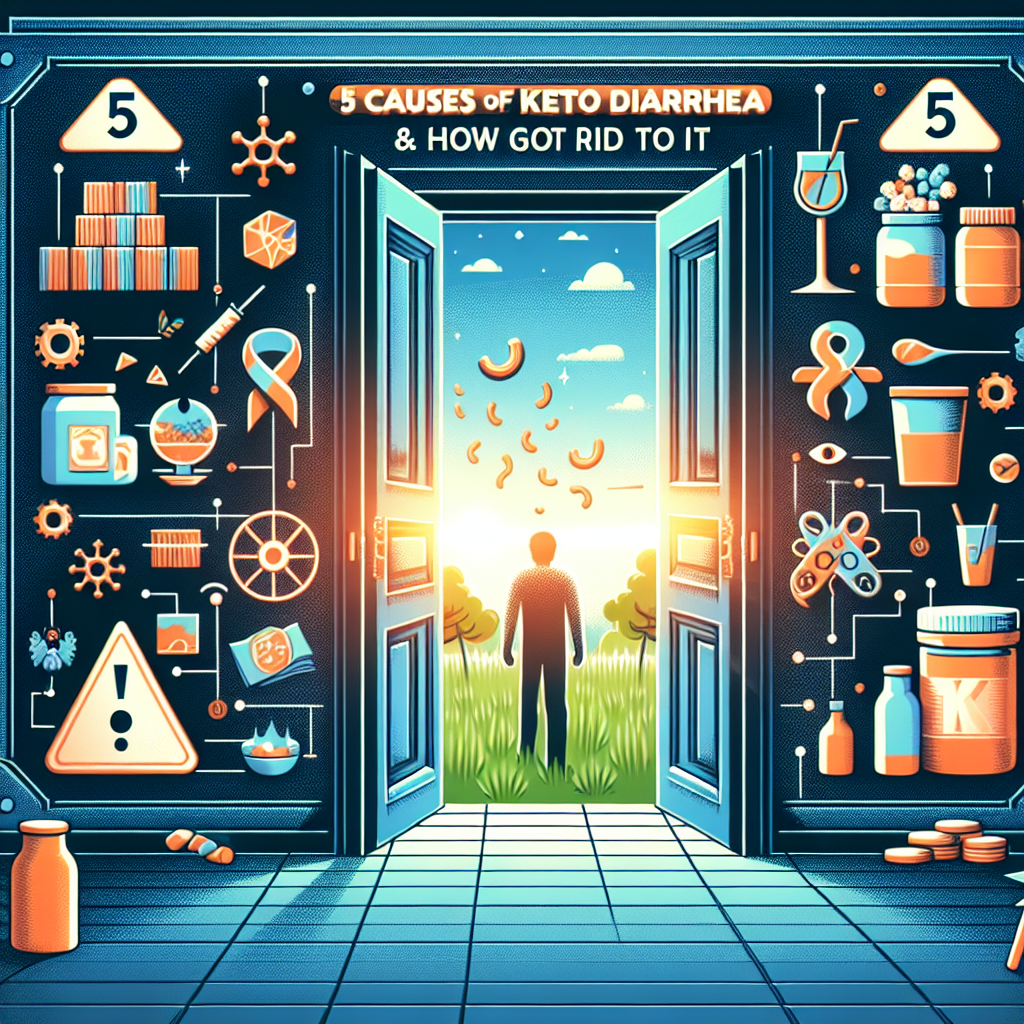
-
Table of Contents
5 Causes of Keto Diarrhea & How to Get Rid of It

The ketogenic diet, popularly known as the keto diet, has gained significant attention in recent years due to its potential benefits for weight loss, diabetes management, and even neurological disorders. However, like any dietary change, it can come with its share of side effects. One such side effect that many people experience when transitioning to a keto diet is diarrhea. This article will explore the five main causes of keto diarrhea and provide practical solutions to help you manage or prevent this uncomfortable condition.
1. A Sudden Increase in Dietary Fat
The keto diet is a high-fat, low-carb diet that requires you to get about 70-75% of your daily calories from fat. For many people, this is a significant increase from their usual dietary fat intake. This sudden change can overwhelm your digestive system, leading to diarrhea.
When you consume a lot of fat, your gallbladder releases bile to help break it down. If your body isn’t used to processing such high amounts of fat, it may not produce enough bile, causing the fat to pass through your digestive system undigested. This can result in loose, greasy stools.
Moreover, consuming a lot of fat can speed up your gut transit time, meaning food moves through your digestive tract more quickly than usual. This can also contribute to diarrhea.
Research supports this idea. A study published in the American Journal of Gastroenterology found that high-fat diets can increase the risk of diarrhea.
How to Manage It
If you suspect that a sudden increase in dietary fat is causing your diarrhea, you may want to consider gradually increasing your fat intake over several weeks to give your body time to adjust. You can also focus on consuming more easily digestible fats, such as avocados and olive oil, rather than harder-to-digest fats like dairy and red meat.
2. Lack of Fiber
Another common cause of keto diarrhea is a lack of dietary fiber. The keto diet restricts many high-fiber foods, such as whole grains and certain fruits and vegetables, because they are high in carbs. This can result in a low fiber intake, which can lead to diarrhea.
Fiber adds bulk to your stool and helps regulate your bowel movements. Without enough fiber, your stool can become loose and watery. A study published in the World Journal of Gastroenterology found that a low-fiber diet can increase the risk of diarrhea.
How to Manage It
To prevent diarrhea caused by a lack of fiber, try to include as many high-fiber, low-carb foods in your diet as possible. These include foods like chia seeds, avocados, almonds, and certain vegetables like broccoli and Brussels sprouts. You can also consider taking a fiber supplement.
3. Artificial Sweeteners
Many people on the keto diet use artificial sweeteners to satisfy their sweet tooth without consuming carbs. However, some artificial sweeteners can cause diarrhea, especially when consumed in large amounts.
For example, sugar alcohols like xylitol, sorbitol, and maltitol are known to have a laxative effect. A study published in the European Journal of Clinical Nutrition found that consuming 20 grams of maltitol can cause diarrhea in healthy adults.
How to Manage It
If you suspect that artificial sweeteners are causing your diarrhea, you may want to consider reducing your intake or switching to a different sweetener. Stevia and erythritol are two sweeteners that are less likely to cause digestive issues.
4. Dehydration and Electrolyte Imbalances
When you first start a keto diet, your body sheds water and electrolytes, which can lead to dehydration and electrolyte imbalances. Both of these conditions can cause diarrhea.
Research supports this idea. A study published in the American Journal of Clinical Nutrition found that dehydration can increase the risk of diarrhea. Another study published in the Journal of the American Medical Association found that electrolyte imbalances can cause diarrhea.
How to Manage It
To prevent diarrhea caused by dehydration and electrolyte imbalances, make sure to drink plenty of water and consume enough electrolytes. You can get electrolytes from foods like avocados, nuts, seeds, and leafy green vegetables. You can also consider taking an electrolyte supplement.
5. Adaptation Period
Finally, it’s important to note that diarrhea can simply be a part of the adaptation period as your body adjusts to a keto diet. This is often referred to as the “keto flu” and usually resolves on its own within a few weeks.
How to Manage It
If you’re experiencing diarrhea during the initial stages of a keto diet, you may just need to give your body time to adjust. However, if your diarrhea persists for more than a few weeks, or if it’s accompanied by other severe symptoms, you should seek medical attention.
Conclusion
While diarrhea can be an uncomfortable side effect of the keto diet, it’s usually manageable and often temporary. By understanding the potential causes and implementing the suggested solutions, you can help prevent or manage this condition and continue to reap the benefits of your keto lifestyle. However, if your symptoms persist, it’s important to seek medical advice to rule out other potential health issues.